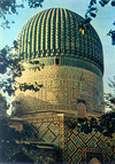|
English
Russian |
 |
 |
Located on the territory
of Central Asia between two rivers, over the thousands of years, Uzbekistan
has experienced many different religions. Religion used to be the primary
foundation of the culture, unifying the countries and the continents,
regardless of nationality and race.
Independence has allowed the revival of the spiritual-religious basis
of the society. The mentality has been mainly formed under the impact
of enlightened Islamic philosophy. The restoration of Islamic cultural
values, accumulated over the past millennium is an important step towards
national self-determination, and the cultural and historical unity of
Uzbek nation.
After Uzbekistan became independent on December 8, 1992, the Constitution
of the Republic of Uzbekistan was adopted. Article 18 of the Constitution
says: All citizens of Uzbekistan shall have equal rights and freedoms,
and shall be equal under the Law, regardless of sex, race, nationality,
language, religion, social origin, convictions, individual and social
status. The Constitution also guarantees freedom of conscience for all
citizens. According to Article 31, everyone shall have the right to profess
or not to profess any religion. Any compulsory imposition of religion
shall be impermissible. The above Article of the Constitution has been
reflected in legislation and, firstly, in the Law of the Republic of Uzbekistan
"On Freedom of Conscience and Religion", which fully corresponds
to international standards. As of now, 15 religious confessions are being
practiced on the territory of the Republic, although some of them are
not traditional for Uzbekistan. Being temporal, the State is adhering
to the following principles:
- respect for the religious feelings of believers;
- acceptance of religious convictions as a private matter either for individuals
and for groups;
- the guarantee of equal rights for all citizens and inadmissibility of
persecution for those who profess and who do not profess religion;
- the necessity of dialogue with different religious groups in order to
use their potential for spiritual revival to establish values common to
all mankind;
- the recognition of the inadmissibility of using religion for destructive
purposes.
|
|



|


